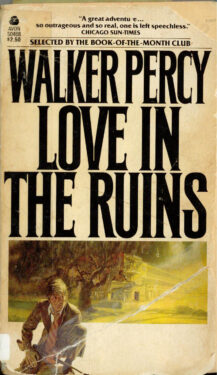Third in a series
Writing this series of columns, using insights from Catholic, existentialist novelist Walker Percy (1916-1990), has been an exceptionally pleasing experience for me.

Years ago I worked very hard in trying to understand Percy’s thought as I was writing a book about his philosophical-religious vision. These three columns have afforded me the opportunity to review and reflect deeply on the insights of a writer I greatly admire. The relationship I have with Percy is unlike any relationship I have with any other author. We had the same preoccupation. What I have been trying to do in philosophy classes, weekly columns, magazine articles and several books, Percy tried to do in six novels and three books of essays. I will state it simply and succinctly: Percy and I presented our philosophical vision by focusing in many ways on the mystery of the human person. Indicating that Percy and I as philosophers had a similar mission, I in no way intend to put myself in the same class as the brilliant novelist whose analysis of the ills of 20th Century United States were so on target and his view of the human person so compelling.
When I started taking graduate courses in philosophy, back in the 1960’s, my interest almost immediately centered on the philosophy of person. Reading the theology that emerged from Vatican II, I came to believe that at the root of all the changes was a new concept of person. I was determined to explore what contemporary philosophy had to say about the mystery of person and to discover how that philosophy might have influenced the theology that was in the documents that emerged from the Council. I can recall, even while still a student, deciding what course I wanted to teach once I received my degree.
There is something else that made these three columns special to me but I am not sure how to communicate that in words. I feel as though I have a special relationship with Walker Percy even though he died 30 years ago. I believe in the Communion of Saints and that to me means that those in heaven can communicate with us. I don’t want to sound “mystical” (and yet why not?) but I feel as though perhaps one of my heroes who is now with God is still helping me in some way similar to the way he challenged, instructed and inspired me as he did before he died. Of course I cannot prove such a relationship exists between the novelist and me but if there is a communion of saints comprising those in heaven and those on earth such relationships can exist. I believe I have such a relationship with my father, mother and sister and perhaps with many others.
I have been trying to find a succinct statement from Percy’s “Lost in the Cosmos: The Last Self-Help Book” (New York: Farrar, Strauss & Giroux, 1983, pp. 262) that would illustrate Percy’s preoccupation with the mystery of person. I don’t think it is a book that you can pick up and read from cover to cover. It contains many questionnaires, and short scenarios designed to lead the reader to reflect on the mystery of the human person. Here is an example of one that Percy presents to illustrate how what he calls the objective consciousness, the way of looking at persons as though they were merely things, misses the mystery:
“The modern objective consciousness will go to any length to prove that it is not unique in the Cosmos, and by this very effort establishes its own uniqueness. Name another entity in the Cosmos that tries to prove that it is not unique.” (p. 254)
Percy’s “Love in the Ruins” is a very funny satire of the 1960’s. The main character, Dr. Thomas More, is about as different from the great Catholic humanist who confronted Henry the Eighth as possible. Early in the novel More identifies himself:
“I … am a Roman Catholic, albeit a bad one. I believe in the Holy Catholic Apostolic and Roman Church, in God the Father, in the election of the Jews, in Jesus Christ His Son our Lord who founded the Church on Peter his first vicar, which will last until the end of the world. Some years ago I stopped eating Christ in Communion, stopped going to mass and have since fallen into a disorderly life. I believe in God and the whole business but I love women best, music and science next, whiskey next, God fourth, and my fellowman hardly at all. Generally I do as I please. A man, wrote John, who says he believes in God but does not keep his commandments is a liar. If John is right, then I am a liar. Nevertheless I still believe.” (p. 6)
The more I think about Percy and his writings, the more I appreciate what a unique voice he was.
Father Lauder is a philosophy professor at St. John’s University, Jamaica. He presents two 15-minute talks from his lecture series on the Catholic Novel, every Tuesday at 9 p.m. on NET-TV.
